 4 citations,
September 2015 in “Case Reports”
4 citations,
September 2015 in “Case Reports” A man fainted and felt unwell after using a strong hair growth product, but got better when he stopped using it.
 4 citations,
September 2011 in “American Journal of Clinical Dermatology”
4 citations,
September 2011 in “American Journal of Clinical Dermatology” Ethinylestradiol/chlormadinone acetate may be an effective and well-tolerated treatment for skin conditions caused by excess androgens.
 4 citations,
January 2010 in “Acta dermato-venereologica”
4 citations,
January 2010 in “Acta dermato-venereologica” Low androgen levels can still cause female pattern hair loss.
 4 citations,
June 2006 in “Primary Care”
4 citations,
June 2006 in “Primary Care” The document recommends a team-based approach and personalized care for managing diabetes in teenagers.
 3 citations,
July 2020 in “Journal of Cosmetic Dermatology”
3 citations,
July 2020 in “Journal of Cosmetic Dermatology” The COVID-19 pandemic led to more young people getting red stretch marks due to lifestyle changes like less activity and quick weight gain.
 3 citations,
April 2019 in “Journal of Dermatological Treatment”
3 citations,
April 2019 in “Journal of Dermatological Treatment” Caffeine shows promise for treating some types of hair loss, but more research is needed.
 3 citations,
January 2019 in “Annals of dermatology/Annals of Dermatology”
3 citations,
January 2019 in “Annals of dermatology/Annals of Dermatology” Hydroxychloroquine effectively treated twenty-nail dystrophy in a patient with alopecia areata.
 3 citations,
July 2013 in “Journal of Cutaneous Pathology”
3 citations,
July 2013 in “Journal of Cutaneous Pathology” A woman's hair loss, resembling an autoimmune condition, improved after treatment, but requires ongoing checks due to potential serious associations.
 3 citations,
January 1992 in “Gynecological Endocrinology”
3 citations,
January 1992 in “Gynecological Endocrinology” 3α, 17β-androstanediol-glucuronide is not a useful marker for androgen excess but may help monitor certain treatments.
 2 citations,
January 2018 in “Journal of The European Academy of Dermatology and Venereology”
2 citations,
January 2018 in “Journal of The European Academy of Dermatology and Venereology” Almost 40% of Greek women with acne show signs of androgen-related disorders, with adult women more likely affected.
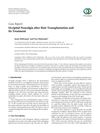 2 citations,
January 2015 in “Case reports in neurological medicine”
2 citations,
January 2015 in “Case reports in neurological medicine” A man's severe head pain after hair transplant was greatly relieved by pulsed radiofrequency treatment.
 2 citations,
January 2014 in “Springer eBooks”
2 citations,
January 2014 in “Springer eBooks” Polycystic Ovary Syndrome (PCOS) often leads to severe acne, and lifestyle changes and hormonal treatments can help manage it.
 2 citations,
April 2013 in “Expert Review of Endocrinology & Metabolism”
2 citations,
April 2013 in “Expert Review of Endocrinology & Metabolism” Identifying nonclassic congenital adrenal hyperplasia and carriers of CYP21 mutations is challenging, and genetic counseling is recommended due to their prevalence.
 2 citations,
July 2012 in “Journal of Pediatric and Adolescent Gynecology”
2 citations,
July 2012 in “Journal of Pediatric and Adolescent Gynecology” A 12-year-old girl with very high testosterone and insulin resistance improved with birth control pills, suggesting PCOS can cause high testosterone without tumors.
 2 citations,
January 2012 in “Journal of metabolic syndrome”
2 citations,
January 2012 in “Journal of metabolic syndrome” The document concludes that hirsutism can be managed with various treatments tailored to the individual, potentially improving quality of life.
 2 citations,
March 2011 in “Infertility”
2 citations,
March 2011 in “Infertility” The conclusion is that lifestyle changes and weight loss are first-line treatments for infertility due to anovulation, with various medications and assisted reproductive technologies as additional options.
 2 citations,
August 2010 in “Journal of the American Academy of Dermatology”
2 citations,
August 2010 in “Journal of the American Academy of Dermatology” A 65-year-old woman has a growing bald spot on her scalp.
 2 citations,
September 2004 in “Fertility and sterility”
2 citations,
September 2004 in “Fertility and sterility” High androgen levels can cause excessive hair growth and may indicate serious health issues, including heart disease and fertility problems.
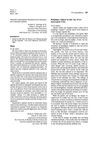 2 citations,
March 1985 in “Journal of The American Academy of Dermatology”
2 citations,
March 1985 in “Journal of The American Academy of Dermatology” Minoxidil solution used on the scalp did not lower blood pressure in patients without hypertension.
 2 citations,
January 1980 in “Acupuncture & electro-therapeutics research”
2 citations,
January 1980 in “Acupuncture & electro-therapeutics research” Hair loss might be due to nerve issues, treatable with electric stimulation or acupuncture.
 1 citations,
January 2021 in “Skin appendage disorders”
1 citations,
January 2021 in “Skin appendage disorders” A woman with alopecia regrew her hair after taking a higher dose of tocilizumab.
 1 citations,
March 2020 in “QJM: An International Journal of Medicine”
1 citations,
March 2020 in “QJM: An International Journal of Medicine” Lactoferrin levels are lower in people with chronic hair shedding, suggesting supplements could help treat it.
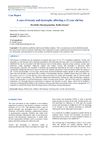 1 citations,
October 2019 in “International journal of contemporary pediatrics”
1 citations,
October 2019 in “International journal of contemporary pediatrics” A 12-year-old boy with twenty nail dystrophy, a condition affecting all nails, was treated conservatively due to its self-limiting nature and good prognosis.
 1 citations,
November 2018 in “Therapeutic Delivery”
1 citations,
November 2018 in “Therapeutic Delivery” New partnerships, clinical trials, and drug approvals marked progress in therapeutic delivery in July 2018.
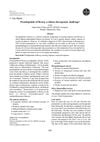 1 citations,
January 2014 in “Health Renaissance”
1 citations,
January 2014 in “Health Renaissance” Pseudopelade of Brocq is hard to diagnose and treat, with limited effective options.
 1 citations,
August 2013 in “Springer eBooks”
1 citations,
August 2013 in “Springer eBooks” Birth control pills and anti-androgen medications help manage hair growth, acne, and hair loss in women with PCOS.
 1 citations,
January 2013 in “Mayo Clinic Proceedings”
1 citations,
January 2013 in “Mayo Clinic Proceedings” A woman's chronic headaches and hair loss were cured by treating her syphilis.
 1 citations,
March 2011 in “Infertility”
1 citations,
March 2011 in “Infertility” Hormone imbalances from the pituitary, thyroid, and adrenal glands can cause infertility, but treating these disorders can improve fertility.
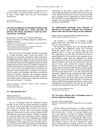 1 citations,
May 2008 in “Toxicon”
1 citations,
May 2008 in “Toxicon” The lowest effective dose of Botox for detrusor sphincter dyssynergia is between 75-100 units.
 1 citations,
January 2008 in “Elsevier eBooks”
1 citations,
January 2008 in “Elsevier eBooks” The document concludes that various disorders can cause hair loss in dogs, each requiring different treatments, and some may heal on their own.






























